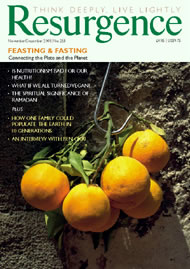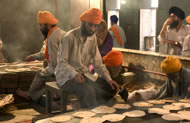IN THE CHRISTIAN tradition feast at Christmas and fast at Lent are significant symbols of the right relationship between people and food, between freedom and restraint and between celebration and solitude.
Feasting and fasting are not opposite; they are complementary. When we practise the freedom of feasting within a framework of fasting, we are more likely to enjoy feasting without over-indulgence.
Fasting is a great skill. In Herman Hesse’s novel, the beautiful courtesan Kamala asks Siddhartha what are his qualifications to win her love. Siddhartha replies, “I can think, I can wait, I can fast.” Sadly, in the modern world most of us know not how to wait, how to fast or, for that matter, how to feast.
We live in a world of TV dinners, junk food and ready meals. This is a world of mass-produced, highly packaged and thoroughly commercialised food systems. This is a world where the knowledge and skills of growing food are undermined, where the art of cooking is debased and where the delight of dining together is diminished. We have lost control of the sources of food. Most of us have no say in how food is grown, distributed, priced or even how it is cooked.
Access to food should be a fundamental human right: food is Nature’s gift to all. Feeding people and all living creatures is intrinsic to life, to existence, but sadly food has become a commercial commodity and no longer available to everyone equally. The primary objective of those who deal in the business of food is to make money, and feeding people has become secondary. No wonder we face multiple crises such as the rising cost of food, and an obesity epidemic alongside malnutrition and world hunger.
The urgent challenge facing us all is to look at the first principal of food systems, which is to sustain life. The primary responsibility of governments and business leaders is to develop policies and practices that meet the food needs of all people around the world, while protecting the integrity and sustainability of the Earth itself.
Growing, cooking and eating good food is an ecological imperative and as Thomas Moore eloquently points out in his article, food is more than just fuel for the body: it is a source of spiritual, social, cultural and physical nourishment.
People ask, “What can we do to combat global warming, environmental degradation and social injustice?” The answer provided by Thomas Moore and other writers in this issue is, “Let us start with food: let us eat local, organic, seasonal and delicious food; let us take food management into our own hands, rather than leaving it to corporations.”
The action of eating the right food is part of the solution to the problems of global warming and global hunger. Food is a microcosm of the macrocosm. When we focus on the food economy we immediately pay attention to the multinational corporations who turn food into a commodity; to genetic engineering of seeds where crop control and agricultural decisions pass from peasants and farmers to managers and engineers. If we are concerned about industrial farming, agri-business, food miles, soil erosion, cruelty to animals, fast foods, fatty foods and non-foods then we have to look at our plate and what is on it. The food in our pantry and in our kitchen is ultimately connected to climate change and global poverty, as well as to our health.
A focus on food will lead to land reform, farmers’ markets, allotment gardens, slow food, artisan food, permaculture, agro-forestry and much more. We have to transform our relationship with food, as a first step towards transforming political, economic and social policies. The personal and political are two sides of the same coin; we cannot do one without the other. When we start with the personal and stride towards the political, then there is integrity in what we say, what we do and what we ask others to do. Of course we cannot stop at just personal lifestyle change; we need to communicate, to organise and build a popular movement to put pressure on governments and businesses to change their ways.
Are we prepared to put our hands in the soil? Have we time to bake bread and share our meals together? If we have no time to cook and eat properly then we have no time to live. As Molière said, “It is good food, not fine words, that keeps me alive.”







